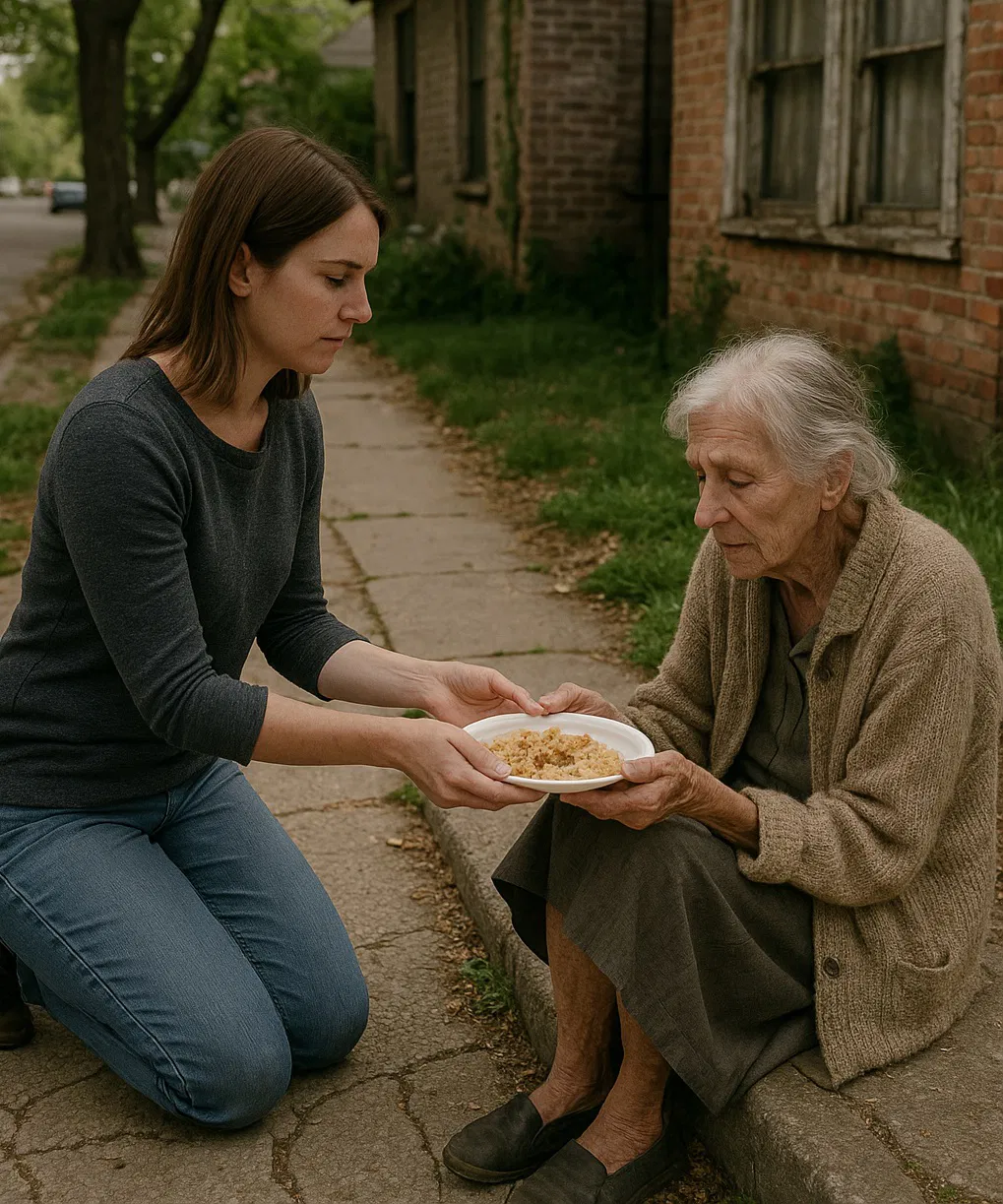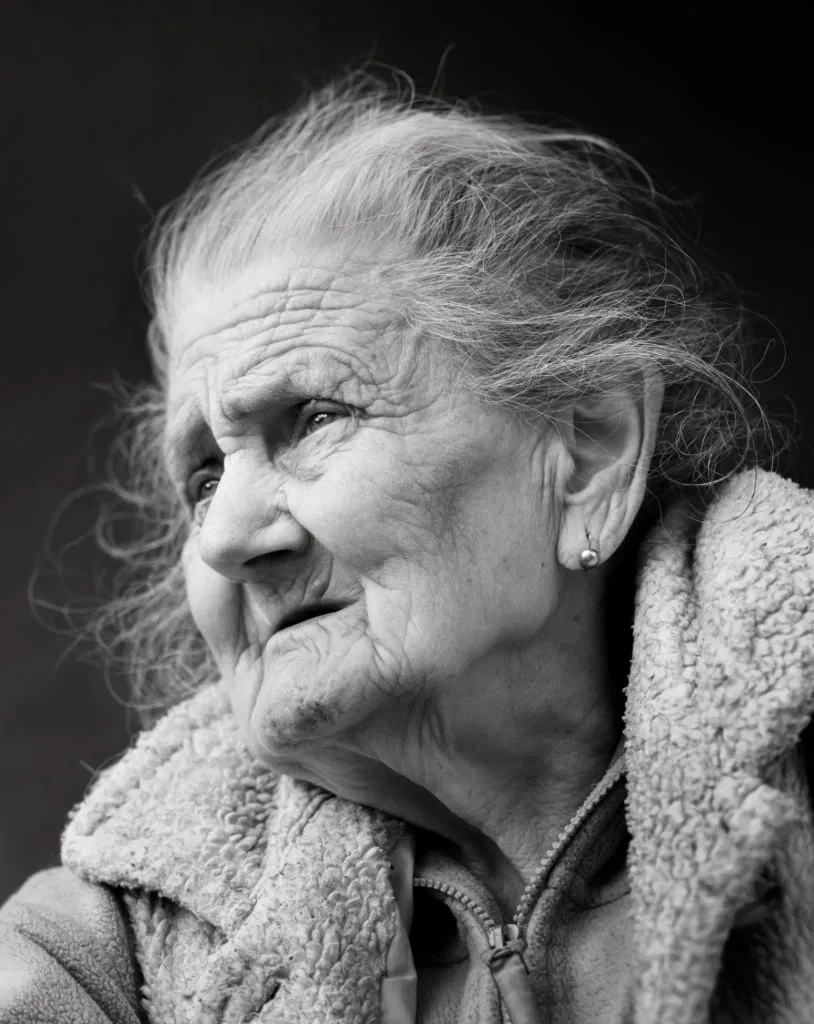
In a world where so many chase success, recognition, and material gain, it’s easy to overlook those quietly drifting through life’s margins. Many of us walk past the lonely souls waiting—not for grand gestures, but simply to be acknowledged.
This story isn’t about heroism or sacrifice. It’s about something simpler, yet infinitely stronger: kindness.
On Maple Street, where trees bent over uneven sidewalks and the air carried the faint scent of spring lilacs, lived an elderly woman.
To most, she was invisible—a figure forgotten in a worn neighborhood, another face dulled by time, another voice silenced by neglect. Her home was barely a home: sagging windows, peeling paint, and curtains yellowed with age. No children visited, no grandchildren knocked on the door, no neighbors paused to check if she was okay.
Each day, she sat on the curb outside, her frail body curled inward, as if she were trying to disappear from a world that had already overlooked her. Her eyes spoke of years of hardship and empty meals.
People passed her by. Some looked with pity, others with indifference. No one stopped.
Except me.
I was an ordinary neighbor, caught up in life’s routines—errands, bills, work—but something about her drew me in. Perhaps it was the way her gaze dropped to the ground, or the way her hands shook when lifted to her face.
One evening, after dinner, I packed my leftovers and carried them across the street.
She looked startled, as if she hadn’t been offered kindness in decades.
“You don’t have to,” she whispered, fragile and almost apologetic.
“I know,” I said softly. “But I want to.”
That night, I watched her eat quietly, and something inside me shifted.
What began as a small gesture became a daily ritual. First, I brought leftovers. Then I started preparing meals with her in mind—hearty soups for chilly nights, stews to last a couple of days, fresh-baked bread on Sundays.
For four years, I delivered food to her door every evening.
She never asked for more. She rarely spoke. Yet in her silence, there was gratitude. In her frailty, resilience.
Neighbors noticed. Some whispered, others shook their heads.
“To them, she was a burden,” I thought. “But to me, she was a reminder: true humanity shows in how we treat those who can give nothing back.”
Feeding her became more than a duty—it became a way to honor her life.

Yesterday, she passed away.
No sirens, no commotion—just a stillness that settled over Maple Street like a heavy fog. Her chair by the curb sat empty, and for the first time in years, the street felt unbearably quiet.
I carried her evening plate out of habit, only to stop mid-step. She was gone.
Tears blurred my vision as I set the plate on her porch, knowing she would never open that door again.
Later, my phone rang. An unfamiliar number appeared.
“This is the county office,” said a gentle voice. “We found your contact information in her belongings. She named you as her emergency contact. She also left something for you.”
I was trembling. She had no one else. Yet somehow, she chose me.
The next morning, I went to the office and was handed a small, worn box. Inside was no jewelry, no money—just a folded letter, the handwriting unsteady, words written with care:
“To the one who truly saw me,
You gave me food, yes, but more importantly—you gave me dignity. You restored my sense of worth. You reminded me that I mattered.
Thank you for being my family when the world forgot me.
—Margaret”
For four years, she had been “the old woman on Maple Street” to me. Now, through her letter, she became real.
That evening, I sat on my porch, staring at her empty chair.
The world often measures greatness in wealth, accolades, and fame. Yet here was a life quiet and unseen that left a legacy more profound than any statue: the memory of shared kindness.
Margaret may have passed, but her gratitude lived on. Her letter taught me that saving a life doesn’t always require grand gestures—sometimes, it only requires showing up: with a plate of food, a warm smile, a willing heart.
In the weeks after, something beautiful happened. Neighbors who had ignored her began stopping by. Some asked about Margaret, others admitted guilt. A few even joined me in volunteering at local shelters. Her story quietly spread, and kindness began to ripple outward.
I keep Margaret’s letter framed by my bedside. It’s a daily reminder: kindness is never wasted. Even when unseen, even when unacknowledged, it leaves lasting ripples.
Feeding Margaret nourished her body. Her gratitude nourished my soul.
On Maple Street, she may have been invisible to many, but to me, she became a teacher. She showed that humanity isn’t measured by wealth or fame, but by how gently we lift others.
Sometimes, I pause at her old spot by the curb. The street feels different now, but her memory lingers—soft, unwavering.
And whenever I see someone overlooked, I remember her words:
“You gave me back my humanity.”
Margaret is gone, but she left something far greater than presence: a reminder that true humanity is found not in applause, but in compassion. Not in riches, but in kindness. Not in being remembered by many, but in being cherished by one.
Sometimes, the greatest acts of love are the simplest: a meal, a smile, a heart willing to care. And that is more than enough.
✨ Kindness doesn’t need an audience. It only needs a willing heart.


